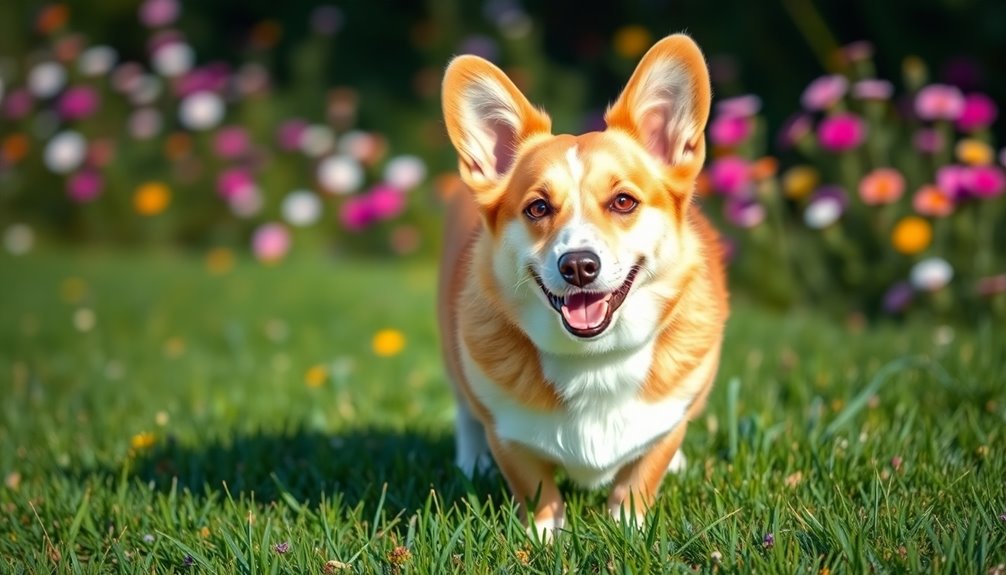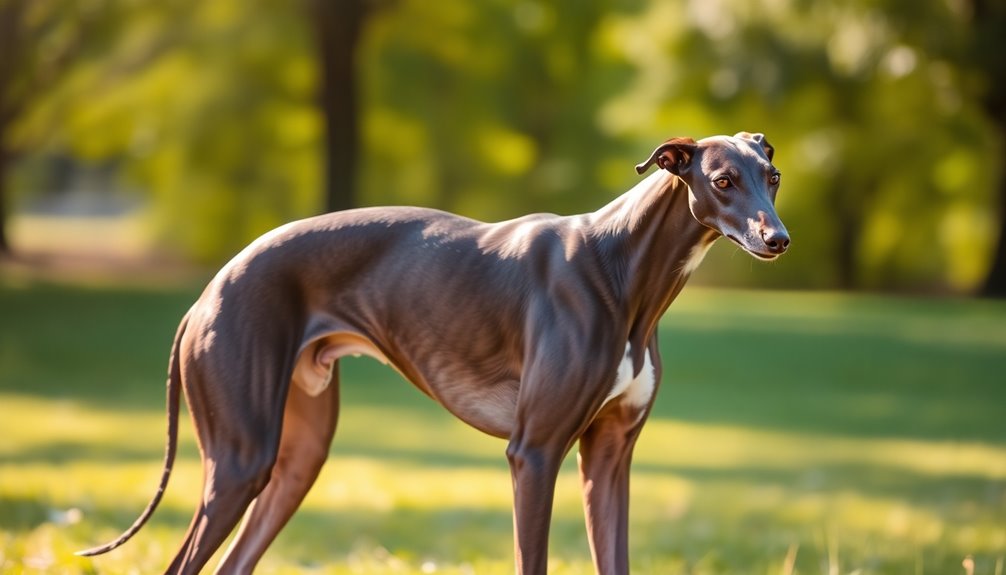The Pembroke Welsh Corgi is a charming little herding dog that stands about a foot tall. With a friendly personality and playful nature, they're perfect for families and individuals alike. Originating in Wales, these dogs boast a sturdy build and a double coat in various colors. Their intelligence means they require regular exercise and training, keeping their minds sharp and bodies fit. While they face some health concerns, a balanced diet and routine check-ups help maintain their well-being. Interested in finding out more about what makes these Corgis so special? There's plenty more to explore about these delightful companions.
Key Takeaways
- Pembroke Welsh Corgis are friendly, intelligent, and playful dogs, making them excellent companions for families and individuals.
- Originating in Wales, they were historically used for herding cattle, showcasing their strong work ethic and agility.
- Their compact size, sturdy build, and unique genetic traits enable them to excel in herding tasks without risk of injury.
- Regular exercise, mental stimulation, and early socialization are crucial to maintain their happiness and prevent behavioral issues.
- Common health concerns include hip dysplasia and intervertebral disc disease, highlighting the importance of a balanced diet and routine veterinary care.
Introduction

The Pembroke Welsh Corgi is a charming breed that captures hearts with its playful spirit and unique appearance. Standing at just 10 to 12 inches tall and weighing between 24 and 30 pounds, these short, sturdy dogs are low to the ground, making them an endearing sight.
Their medium-length double coat features a coarse topcoat and a soft undercoat, adding to their distinctive look.
Corgis are known for being friendly, outgoing, and playful, making them great companions. They're loyal and protective, often taking on the role of a watchdog. Highly intelligent, they're responsive to training but can be quite vocal, so be prepared for some barking. With a life expectancy of 12 to 13 years, they can bring joy and companionship for many years.
With a strong herding instinct, they might nip at ankles, especially if not properly socialized and trained early on.
Regular exercise is essential for Corgis to burn off their energy, and they thrive on daily walks and engaging activities. Grooming is minimal, but don't forget that they do shed.
History and Origin
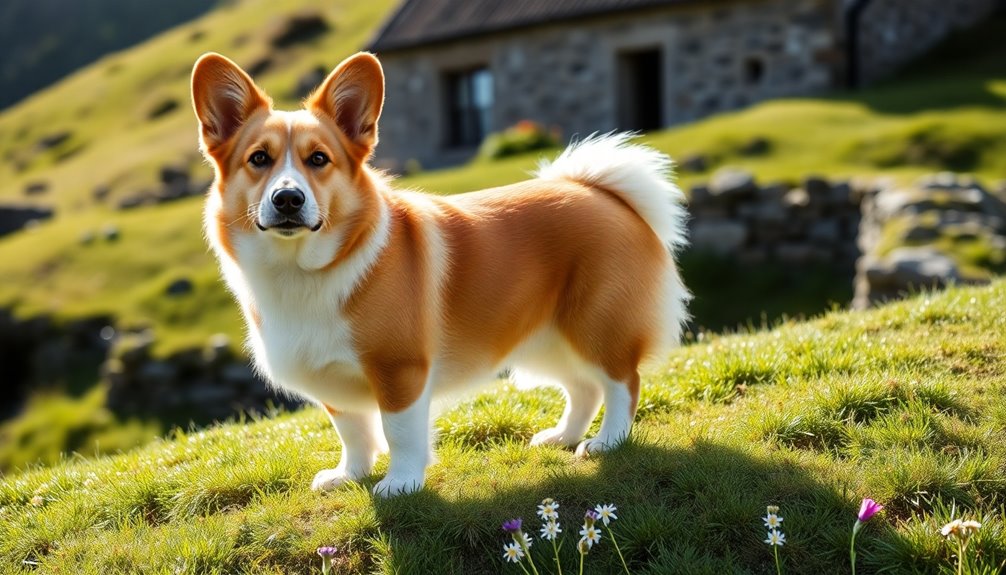
You'll find that the Pembroke Welsh Corgi traces its roots back to around 1107 A.D. in Wales, where these sturdy dogs were originally used for herding cattle. With a lineage connected to spitz-type breeds, they not only served as herders but also as loyal guardians of livestock. Understanding their history helps you appreciate the unique traits that define this beloved breed today. Their popularity soared after being embraced by Queen Elizabeth II, who has owned them since 1933.
Where and when the breed originated
Historically, the Pembroke Welsh Corgi often traces its roots back to Pembrokeshire, Wales, where it emerged around the 10th to 12th centuries. You'll find that this area played a significant role in the breed's development due to its strategic location.
The influence of Scandinavian raiders and Flemish weavers was crucial, as they brought their own herding dogs to the region. The weavers settled in Pembrokeshire around the 12th century, introducing new bloodlines that would shape the Corgi.
Some theories even suggest that the breed's origins might stretch as far back as the 9th century. By 1107 A.D., historical records confirm the presence of these dogs in Pembrokeshire.
The native Welsh dogs were bred with the imported spitz-type breeds, such as the Keeshond and Pomeranian, which contributed to the Corgi's unique characteristics. Interestingly, both the Pembroke and Cardigan Welsh Corgis are recognized as distinct breeds since 1934, highlighting their long-standing heritage.
You might notice that while the Celts didn't directly influence the Pembroke Welsh Corgi, they did impact the development of the Cardigan Welsh Corgi.
Cattle Herding and Guarding
With a rich history rooted in herding, the Pembroke Welsh Corgi took on vital roles in managing livestock across Great Britain. These short, sturdy dogs served as effective "heelers," nipping at the heels of cattle and sheep to keep them moving. Their low height and agility allowed them to skillfully dodge cattle hooves, ensuring they could escort cows to common grazing lands and safely return them for milking.
In the rugged terrain of Wales, they also handled smaller livestock, making them invaluable to farmers. Beyond herding, Corgis were tasked with rodent control and guarding other livestock, protecting the human family as part of their duties. Their ability to reach speeds of up to 25 mph demonstrates their agility and enhances their herding capabilities.
Their compact size meant they excelled at any task that didn't require longer legs, making them versatile helpers on the farm. The Pembroke Welsh Corgi's muscular build, sharp-pointed muzzle, and erect ears contributed to their effectiveness, while their high energy and intelligence made them excel in various canine events.
As you delve into the history of this charming breed, you'll appreciate how their herding instincts shaped their role in agricultural life and continue to influence their behavior today.
Physical Characteristics
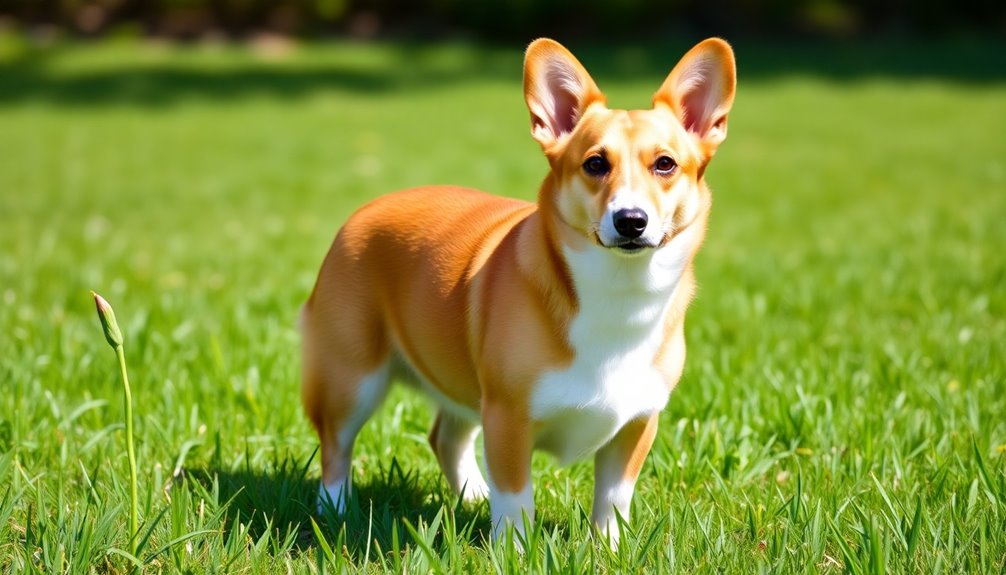
When you look at a Pembroke Welsh Corgi, you can't help but notice their compact size and sturdy build. Standing about 10-12 inches tall and weighing between 24 to 28 pounds, these dogs are both short and stocky, making them quite adorable. Their short, double coat comes in a variety of colors, adding to their distinctive appearance. This breed is classified as a Herding Dog by both the AKC and UKC, reflecting their historical role as farm dogs adept at herding cattle.
Size, weight, and coat details
At around 12 months, Pembroke Welsh Corgis typically reach their full height, standing between 10 and 12 inches tall at the shoulder. Males usually hit around 12 inches, while females are slightly shorter at about 10 inches.
Although their height stabilizes by a year, some corgis may continue to fill out until they're two or three years old.
When it comes to weight, you'll want to keep your corgi within a healthy range of 27 to 30 pounds. Males generally tip the scale at about 30 pounds, while females hover around 28 pounds. Some sources suggest a slightly lower range of 23-28 pounds, but it's essential to monitor your pup's weight as they mature. Genetics play a significant role in determining the adult size and weight of Pembroke Welsh Corgis.
As for their coat, Pembroke Welsh Corgis sport a smooth, double coat that's both weatherproof and easy to maintain. You can find them in various colors, including red, sable, fawn, and black and tan, often with white markings. Be mindful that excessive white, particularly on the head, can sometimes indicate health issues. Regular grooming keeps their coat looking its best, especially if you encounter a "fluffy" corgi.
Short, Stubby Legs
The Pembroke Welsh Corgi's short, stubby legs are one of its most distinctive physical characteristics. These legs result from a genetic condition called achondroplasia, a form of dwarfism that intentionally got bred into the breed to boost its herding capabilities.
With their unique body structure, Corgis can efficiently nip at the heels of cattle without the risk of being kicked. This short stature also enables them to navigate in and out of cows' stables with ease.
You'll notice that the front legs have a slight curve from the elbows, while the hind legs are strong and well-angulated, providing stability and agility. The oval-shaped feet, with slightly longer center toes, enhance their grip on various terrains.
Their short legs create a lower center of gravity, which is crucial for quick turns and rapid movements, essential traits for a herding dog. Additionally, these short-legged Corgis excelled in herding tasks, showcasing their ability to perform their jobs effectively despite their size.
In essence, the Pembroke Welsh Corgi's short, stubby legs aren't just adorable; they're a functional adaptation that makes them exceptional herders. This distinctive feature contributes to the breed's overall charm and effectiveness in their traditional roles.
Temperament and Personality

When you bring a Pembroke Welsh Corgi into your home, you're welcoming a playful and intelligent companion. Their friendly nature makes them great for families, individuals, or even other pets, as long as you invest in proper training and socialization. You'll find that their loyal disposition and eagerness to please create a wonderful bond between you and your new furry friend. These dogs are known for their high energy levels, requiring regular exercise to keep them happy and healthy.
Playful and Intelligent Companions
Brimming with intelligence and energy, Pembroke Welsh Corgis make delightful companions that thrive on interaction. Ranked as the eleventh most intelligent dog breed, they're quick learners eager to please you. Using positive reinforcement methods, you'll find training them relatively easy, as they respond well to basic obedience commands and enjoy various dog activities. Their executive function skills enable them to be responsive during training sessions, enhancing their learning experience.
Their playful, fun-loving nature often makes them feel like "a big dog in a small dog's suit." Corgis love attention and can be real clowns, always ready to engage in high-energy play with other dogs. To keep them happy, regular daily walks and playtime are essential. Activities like agility training or dock diving can be fantastic outlets for their energy. Additionally, their high shedding means that regular grooming is essential to maintain their coat health.
Though protective and tenacious, Corgis make excellent watchdogs, alerting you to any unusual happenings. However, their strong herding instinct may lead them to nip at ankles, so consistent, patient training is crucial. Their temperament reflects their ability to adapt, as children's temperament can influence their interactions with pets.
They thrive on social interaction and enjoy being involved in family activities. With early socialization, they adapt well to different environments and get along with children and other pets, making them the perfect playful and intelligent companions.
Suitability for families, individuals, or other pets
Pembroke Welsh Corgis aren't just playful and intelligent companions; they're also well-suited for a variety of living situations. Their friendly disposition makes them great for families, especially with children. They adapt well to family environments and can be both loyal and protective. However, keep in mind their herding instincts may lead them to nip at little ones' ankles.
Whether you live in a cozy apartment or a larger home, Corgis can thrive with moderate exercise and a small space to enjoy. They're known for their unwavering loyalty, making them excellent watchdogs despite their size. Their strong sense of alertness ensures that they will quickly notify you of any unusual activity. Engaging them with educational toys can help channel their intelligence and energy positively.
For individuals, their affectionate nature allows them to form close bonds, but they do need mental and physical stimulation to avoid boredom. Corgis generally get along with other pets, especially smaller breeds, but proper introductions are essential. Their herding instincts may cause them to be a bit pushy with unknown pets.
Regular grooming and training are manageable, making Corgis suitable for first-time owners. Overall, Pembroke Welsh Corgis can be loving, adaptable companions for families, individuals, and even other pets.
Health and Lifespan
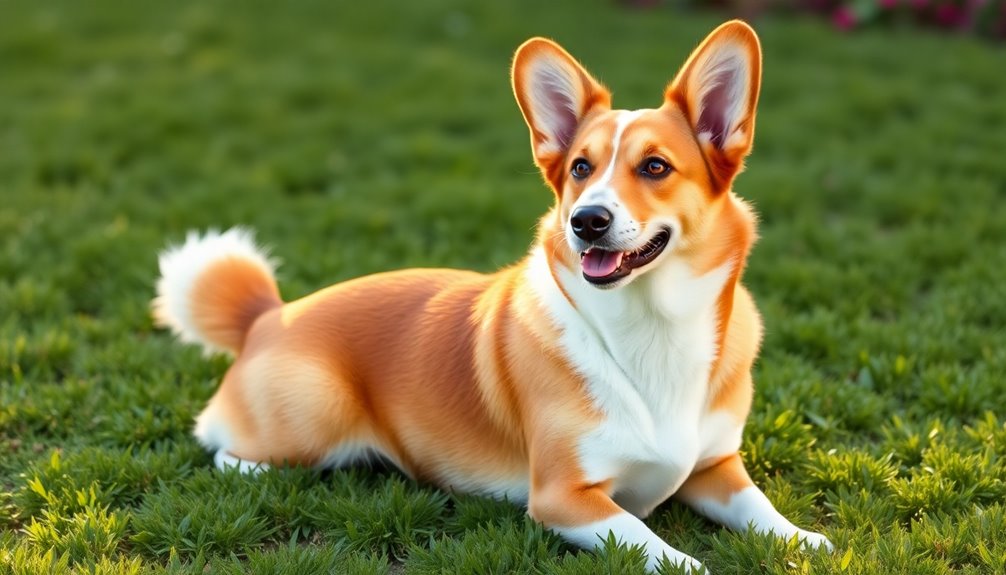
When you bring a Pembroke Welsh Corgi into your life, it's important to understand their typical lifespan of 12 to 13 years and the common health concerns that can arise. Being aware of genetic predispositions like hip dysplasia and cardiac issues can help you take proactive steps for their well-being. Regular health checks are vital for early detection of common health issues.
Typical lifespan of the breed
Corgis typically enjoy a lifespan ranging from 12 to 13 years, though with proper care, some can live up to 15 years or more. Several factors influence this lifespan, including genetics, diet, and living conditions. Responsible breeding practices play a crucial role in ensuring healthier dogs, while a balanced, high-quality diet is essential for maintaining their overall health.
Regular exercise not only keeps your Corgi active but also contributes to a longer life. A safe living environment where they can play and socialize is equally important. Regular veterinary check-ups help in early detection of health issues that can affect your Corgi's longevity.
Daily grooming, including brushing their coat and teeth, helps maintain health as well. It's vital to schedule regular veterinary checkups to catch any potential health issues early on. Monitoring your dog for unusual symptoms will allow you to address any concerns promptly.
Furthermore, ensuring a climate-controlled environment with fresh food and water will enhance your Corgi's comfort and longevity. Avoiding overbreeding, especially in females, is important to prevent health complications.
Lastly, providing your Corgi with a sense of purpose and plenty of family interaction can significantly boost their well-being and happiness.
Common health concerns or genetic predispositions
Health is a significant concern for Pembroke Welsh Corgi owners, as this breed is prone to various genetic diseases and health issues.
One major condition you should be aware of is Degenerative Myelopathy (DM), which affects the spinal cord and leads to muscle wasting and gait abnormalities. This progressive disease can significantly impact your dog's quality of life. Additionally, genetic testing for DM can help identify carriers, allowing for informed breeding decisions.
Another concern is Von Willebrand Disease Type I (vWD1), a blood clotting disorder that can result in excessive bleeding.
Progressive Retinal Atrophy (PRA) causes non-painful vision loss, starting with night blindness. Additionally, be mindful of conditions like hip dysplasia and intervertebral disc disease (IVDD), which can lead to mobility issues. Corgis are also susceptible to back problems due to their dwarfism.
Cardiac issues, including Patent Ductus Arteriosus (PDA), can strain your dog's heart and lead to severe complications.
Lastly, dental disease is prevalent, often leading to more serious health concerns if left untreated. Regular vet check-ups and awareness of these issues can help you manage your Pembroke Welsh Corgi's health effectively.
Tips for maintaining health and wellness
Maintaining the health and wellness of your Pembroke Welsh Corgi is essential for ensuring a long, happy life together. Schedule regular veterinary check-ups to catch any health issues early and keep up with vaccinations, dental care, and parasite prevention. Your vet can recommend a tailored health plan and may suggest genetic testing to identify potential problems.
A balanced diet is crucial, so consult your veterinarian for dietary recommendations based on your Corgi's age, weight, and activity level. Use high-quality food and avoid overfeeding to prevent obesity, a common concern with this breed. Always provide fresh water. Additionally, maintaining a healthy weight can help reduce strain on the spine, which is particularly important given the Corgi's predisposition to IVDD. Understanding dietary impact on health can also guide your choices in feeding.
Regular exercise is vital for physical and mental health. Engage your Corgi in activities like walking, running, herding, or playing fetch to keep them fit and content. Consider canine-friendly agility courses or tech-driven games to mix things up.
Don't forget about mental stimulation! Use interactive toys and puzzle feeders to prevent boredom.
Regular grooming, including brushing, nail trimming, and dental care, is also important. Grooming sessions allow you to check for any unusual lumps or signs of illness, ensuring your Corgi remains healthy and happy.
Care Requirements
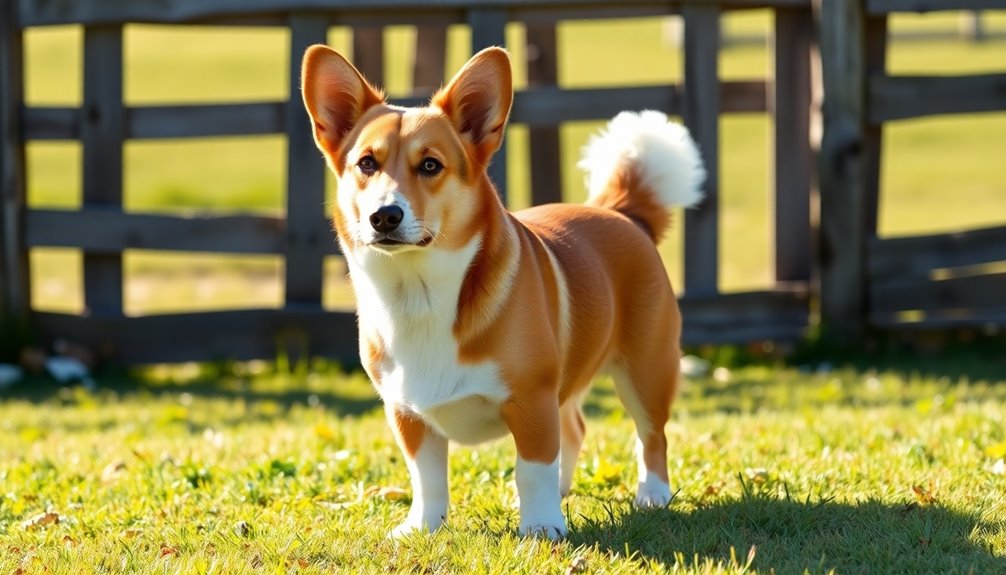
Caring for your Pembroke Welsh Corgi involves regular brushing to keep their double coat in top shape and prevent matting.
You'll also need to ensure they get plenty of exercise to match their high energy levels. Regular exercise is essential for maintaining a healthy weight and preventing excess fat that can lead to serious health issues.
Lastly, paying attention to their diet is crucial to maintain a healthy weight and overall well-being.
Regular Brushing Required
Regular brushing is essential for keeping your Pembroke Welsh Corgi's coat in top condition. You should brush your dog several times a week, with daily brushing recommended during shedding seasons in spring and fall. This routine helps remove loose fur, prevents matting, and keeps the coat looking shiny and healthy.
To get started, use an undercoat rake or shedding blade to tackle the loose undercoat hair. A slicker brush is perfect for the topcoat, while a pin brush can fluff up the coat for a polished finish. When you encounter tangles or mats, gently work through them with a wide-toothed comb or your fingers. A consistent grooming routine not only maintains the coat's health but also helps your Corgi feel comfortable and relaxed during the process.
Make sure to focus on areas prone to matting, like behind the ears, under the collar, and around the tail. The feathering on the legs and tail also requires extra attention.
Daily cleaning of the eyes and weekly ear checks are crucial for overall health. Don't forget to trim nails regularly and maintain good oral hygiene by brushing teeth several times a week.
With positive reinforcement and treats, you can make grooming a pleasant experience for both you and your Corgi.
Exercise requirements and energy levels
To keep your Pembroke Welsh Corgi happy and healthy, daily exercise is a must. Aim for at least one hour of moderate to vigorous physical activity each day, which you can split into two or more sessions. Activities like brisk walks, fetch, and agility courses not only keep them fit but also engage their minds. Providing a variety of payment options can enhance customer satisfaction, much like how diverse exercise routines benefit your Corgi's well-being.
For puppies, focus on short, frequent play sessions lasting 30 minutes to an hour to protect their developing joints. Avoid high-impact activities until they're fully grown. Adults can handle a full exercise routine around 12 to 18 months, while seniors benefit from gentle, regular exercise to maintain mobility. Regular exercise helps prevent obesity, which is crucial for avoiding health complications in Corgis.
It's essential to monitor your Corgi's exercise needs, as individual requirements can vary based on age, health, and personality. Regular exercise helps prevent obesity and related health issues like hip dysplasia. Incorporate low-impact activities like swimming or walking to avoid straining their joints.
Additionally, mental stimulation through interactive games and obedience training is crucial to prevent boredom and destructive behaviors. Engaging their natural herding instincts will also keep them entertained and active. Just like merchant services providers support businesses with various payment options, engaging activities can keep your Corgi mentally and physically healthy.
Feeding tips and diet recommendations
A well-balanced diet is crucial for your Pembroke Welsh Corgi's overall health and well-being. Adult Corgis typically need between 780 to 920 calories daily, depending on their age, activity level, and health status. Puppies, being more active, require more calories, while older or less active Corgis may need fewer.
It's best to feed your Corgi two meals a day for consistency. Focus on high-quality animal protein as the cornerstone of their diet—options like chicken, beef, or fish are excellent. Include healthy fats, such as fish oil, to promote energy and maintain a shiny coat. A raw diet can greatly enhance their overall health and happiness.
Carbohydrates should come from whole grains or vegetables, avoiding fillers like corn or soy. A balanced diet includes proteins, fats, and modest carbohydrates, with plant-based ingredients offering fiber and antioxidants.
Since Corgis are prone to obesity, monitor their weight and adjust their diet accordingly. Treats should be limited to 10% of their daily calories. Lastly, opt for high-quality, AAFCO-approved dog food or raw diets, and consult your vet if you notice any allergies or need to make dietary changes.
Training and Socialization
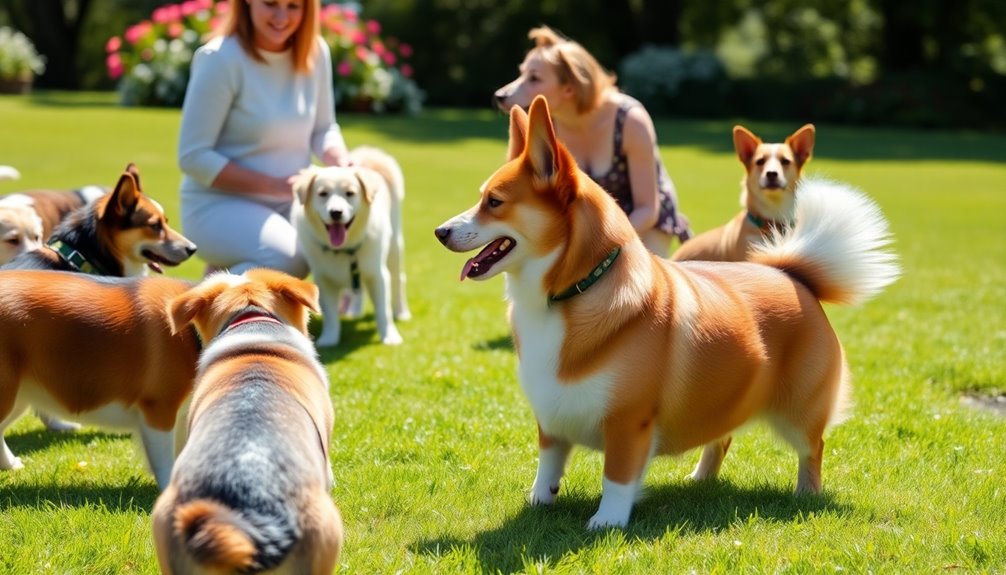
When it comes to training your Pembroke Welsh Corgi, consistency is key, as these dogs are highly trainable with the right approach. Gradually exposing them to new environments helps build their confidence and adaptability. It's also important to address potential separation anxiety in puppies through early socialization and positive experiences. Incorporating positive reinforcement in your training sessions can further enhance their learning and strengthen your bond.
Highly Trainable With Consistency
Many owners find that Pembroke Welsh Corgis are highly trainable when approached with consistency and patience. Starting training between 8 to 12 weeks of age sets a solid foundation for good behavior.
Focus on basic commands like sit, stay, come, and down, using positive reinforcement techniques such as treats, praise, and toys. Corgis respond well to rewards, making it essential to celebrate desired behaviors and avoid punishment-based methods, which can lead to fear and anxiety. Additionally, their strong herding instincts can be utilized to engage them in training exercises that mimic herding activities, keeping them mentally stimulated.
Consistency in your training methods and expectations is crucial, especially since Corgis can be stubborn. Use clear, consistent cues and gestures for commands, and practice in various environments to reinforce learning.
Remember, patience is key; training may take time, so don't get frustrated or discouraged. Additionally, redirect any undesirable behaviors with positive reinforcement techniques to maintain a healthy training atmosphere.
Celebrate small successes along the way to keep motivation high. With dedication, your Pembroke Welsh Corgi will learn effectively and flourish as a well-behaved companion. Embrace the journey, and enjoy the bond that develops through consistent training efforts.
Gradual Exposure to New Environments
How can you ensure your Pembroke Welsh Corgi thrives in new environments? Start by prioritizing early socialization, ideally between 3 and 14 weeks of age. Expose your pup to different people, dogs, and settings to prevent fear and anxiety later in life.
Gradually introduce new stimuli, beginning with low-intensity experiences, and slowly increase the challenges. Use positive reinforcement—treats, praise, and play—to create positive associations. Additionally, understanding your dog's individual temperament will help tailor the socialization process to their specific needs.
Always pay attention to your dog's body language. If they show signs of stress, adjust the exposure accordingly. Begin in quieter areas and introduce small changes within familiar environments, like new toys or blankets, to boost their confidence.
Engage in familiar activities in new surroundings to help them feel secure. Reward calm behavior with treats and praise, and keep initial sessions short. As your Corgi grows more comfortable, gradually extend the duration of these experiences.
If negative encounters arise, address them quickly using desensitization techniques. Be patient, allowing your dog to explore at their own pace, ensuring they build a positive connection with new environments. This approach will help your Pembroke Welsh Corgi become a confident, well-rounded companion.
Separation Anxiety in Puppies
Separation anxiety can be a significant challenge for Pembroke Welsh Corgi puppies, given their strong social bonds and herding instincts.
These pups thrive on companionship, so when you leave them alone, anxiety can set in. You might notice symptoms like pacing, drooling, or even destructive behavior when they're feeling anxious. To help prevent this issue, start with early socialization. Introduce your puppy to different people, animals, and environments to build their confidence.
Use positive reinforcement—reward them with treats and praise when they remain calm. It's also important to establish a predictable daily routine for feeding, exercise, and playtime. Consider incorporating effective treatment methods to further aid in reducing their anxiety levels.
Teach your puppy to enjoy alone time by gradually increasing the duration they spend in a safe space, like a cozy crate or designated area. Focus on settle and relaxation training, promoting calm behavior through commands. Minimize fuss during departures to prevent anxiety triggers, and consider leaving engaging toys or chews to keep them occupied.
Ideal Living Environment

To keep your Pembroke Welsh Corgi happy and healthy, you'll need a spacious home with a secure yard where they can play safely. They thrive in moderate temperatures year-round, so it's essential to maintain a comfortable environment for them. Make sure to provide plenty of social interaction and exercise to meet their energetic needs. Regular engagement in activities such as canine events and training can further enhance their well-being and bond with their owners.
Spacious Home With Secure Yard
Creating a spacious home with a secure yard is essential for keeping your Pembroke Welsh Corgi happy and healthy. These energetic dogs require at least one hour of exercise each day, so having room to run and play is vital. A fenced yard is a must; it keeps your Corgi safe from external threats and prevents them from escaping. This security allows them to expend energy freely while curbing their herding instincts towards other animals or people outside the yard.
While Pembroke Welsh Corgis can thrive in various living situations, including apartments, they still need regular walks and activities like herding, agility, or obedience training to stay mentally and physically stimulated. Additionally, their affectionate temperament makes them wonderful companions for families.
Make sure your yard is well-maintained—remove hazards and monitor for escape routes to ensure safety. Providing shaded areas and maintaining proper drainage will also help keep your Corgi healthy.
Lastly, your home should be family-oriented, allowing your Corgi to feel included and loved. Early socialization with pets and children will help them adapt better and prevent destructive behaviors.
A spacious home and secure yard create the perfect environment for your Pembroke Welsh Corgi to flourish.
Prefers Moderate Temperatures Year-Round
Pembroke Welsh Corgis thrive in moderate temperatures year-round, making them well-suited for temperate climates. They feel comfortable in temperatures up to 85 degrees Fahrenheit, but anything above that can lead to discomfort.
When it gets too hot, it's best to keep your Corgi indoors in a cool place, as they can overheat easily. Conversely, Corgis can handle temperatures down to 50 degrees Fahrenheit without much trouble, but you'll need to provide extra warmth if it drops lower.
These dogs adapt well to seasonal changes. In spring, they shed their dense undercoat to prepare for the heat of summer, while their outer coat sheds lightly throughout the year. Their robust double coat allows them to endure the cold, and many Corgis enjoy brisk walks even when temperatures dip to -10° to -15° C. However, during extreme cold or harsh wind chill, it's advisable to keep them indoors. Corgis possess a double coat that provides insulation in winter and prevents overheating in summer.
Royal Family Favorite

You might be surprised to learn that the Pembroke Welsh Corgi is Queen Elizabeth II's favorite dog breed, with a history that dates back to the 1930s. Their charm even inspired the animated film "The Queen's Corgi," showcasing the special bond between the royal family and these beloved dogs. As you explore this connection, you'll see how Corgis became intertwined with the monarchy's identity. The Queen's hands-on approach to Corgi care further deepened this unique relationship.
Queen's Favorite Dog Breed
The Queen's affection for Pembroke Welsh Corgis blossomed early in her life and became a defining aspect of her royal persona. It all started in 1933 when her father, King George VI, brought home a corgi named Dookie, marking the royal family's first introduction to the breed.
By 1944, she received her first corgi, Susan, as a gift for her 18th birthday, which laid the foundation for the Queen's beloved corgi bloodline. Over her reign, she owned more than 30 Pembroke Welsh Corgis, with the largest number being 13 in the early 1980s. The largest number of corgis owned simultaneously was a remarkable reflection of her deep affection for the breed.
The Queen personally cared for her dogs, feeding them a diet crafted by the royal kitchens and ensuring they received homeopathic treatments. Her corgis were often by her side during official tours and public appearances, becoming an integral part of her image.
Even in their passing, the Queen honored her corgis, burying them with individual plaques. After her death, arrangements were made for their care, ensuring her legacy of love for these charming dogs continued. They truly were more than pets; they were a source of comfort and companionship throughout her life.
Animated Corgi in "The Queen's Corgi
Adventure and loyalty intertwine in "The Queen's Corgi," a charming animated film that brings the beloved Pembroke Welsh Corgis to life.
You'll follow Rex, the Queen's favorite corgi, as he navigates a wild journey after getting lost. The trouble begins when Rex is chased by Mitzi, President Donald Trump's dog, leading to an unexpected bite that sends him on a thrilling escapade. This unexpected turn of events echoes the scrutiny public figures face in their personal narratives, illustrating how even fictional tales can reflect real-life tensions.
While lost, Rex makes new friends at a shelter, including Wanda, a spirited Saluki. However, not everything is smooth sailing; Tyson, a former fighting dog, poses a threat as he runs the kennel and has his eyes set on Wanda. In a twist of fate, Rex faces adversity as he is discarded by Charlie, a jealous corgi, showcasing the challenges of friendship and loyalty.
The plot thickens, but Rex ultimately shows his courage when he returns to the palace and saves both himself and Wanda from a fire.
Despite mixed reviews and a 0% approval rating on Rotten Tomatoes, the film generated $31.4 million worldwide, proving it has its audience.
With a talented voice cast, including Jack Whitehall and Julie Walters, "The Queen's Corgi" captures the hearts of viewers and celebrates the charm of these royal dogs.
Corgis Thrive on Social Interaction
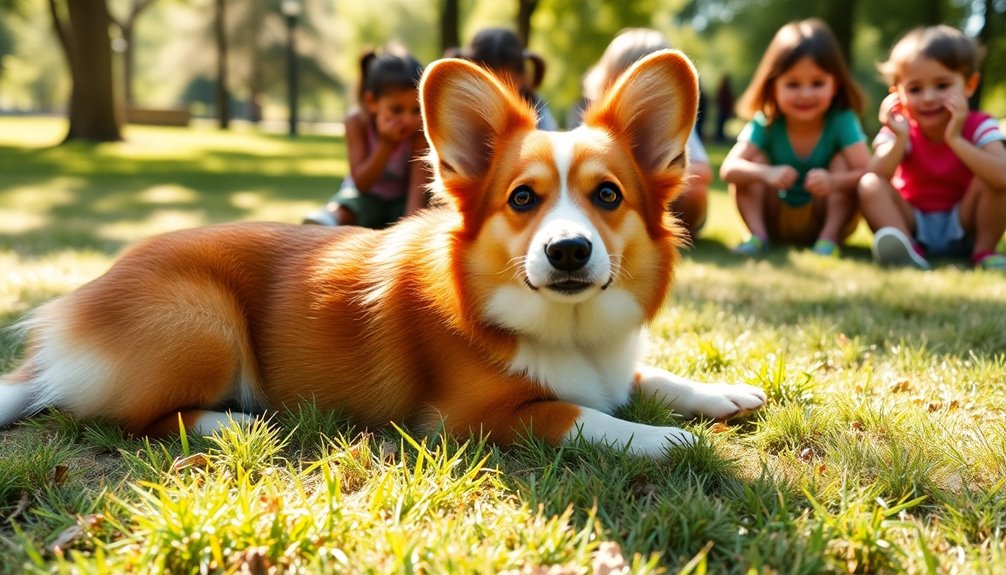
Corgis are perfect for active households because they love to be involved in everything you do. Their friendly nature means they'll happily interact with family members and other pets, making them a joy to have around. Plus, understanding their grooming needs and shedding levels is essential for keeping your home comfortable while enjoying their companionship. Their intelligent and loyal temperament makes them excellent companions for various family activities.
Ideal for Active Households
Pembroke Welsh Corgis are perfect companions for active households, thriving on social interaction and engagement. Their friendly and affectionate nature makes them great family dogs, and they develop strong bonds with you and your loved ones.
Corgis adore being around people and other pets, which means they adapt easily to a bustling home environment. Additionally, their high energy levels necessitate regular exercise to keep them content and well-behaved. Regular exercise is important for mental clarity, which can enhance their overall well-being.
To keep your Corgi happy and healthy, you'll need to provide at least an hour of exercise each day. Activities like walking, fetch, and agility exercises are essential to burn their high energy levels.
Because Corgis are intelligent and trainable, incorporating mental stimulation into their routine is equally important. Puzzle toys and training sessions can engage their minds and prevent boredom.
Early socialization is crucial for Corgis to ensure they grow into friendly and confident companions. With proper training and positive reinforcement, you'll find that your Corgi can thrive in a household bustling with activity.
They're great with kids and other pets when properly socialized, making them ideal for families looking to add a lively and loving member to their home.
Grooming Needs and Shedding Levels
Maintaining a Pembroke Welsh Corgi's coat requires regular attention due to their thick double coat and heavy shedding. You'll need to brush your Corgi at least once a week, but daily brushing during seasonal shedding—typically in spring and fall—will help manage loose hair. Use slicker or pin brushes to effectively remove tangles and minimize mats. Regular brushing not only helps reduce shedding but also prevents mats and clumps from forming in the undercoat.
Bathing isn't necessary often, but giving your Corgi an occasional bath with a gentle shampoo will keep their skin and fur healthy. After bathing, thoroughly dry your Corgi to prevent hot spots.
Nail trimming should be done monthly to ensure comfort and proper posture, while regular ear cleaning is crucial to avoid infections—use a dog-specific solution and cotton balls.
Don't forget about dental health! Brushing your Corgi's teeth at least two to three times a week is essential to prevent dental issues.
With their heavy shedding, be prepared for hair around your home, but with a consistent grooming routine, you can keep it manageable. Regular grooming not only keeps your Corgi looking great but also strengthens your bond.
Frequently Asked Questions
How Much Exercise Do Pembroke Welsh Corgis Need Daily?
Pembroke Welsh Corgis need at least an hour of exercise each day. You can split this into two half-hour sessions, one in the morning and one in the evening.
Activities like walks, playtime, and interactive games keep them physically and mentally stimulated. High-energy pursuits, such as runs or hikes, are great too, but avoid jumping or excessive strain on their backs.
Tailor the routine to fit your dog's individual needs and energy level.
Are Pembroke Welsh Corgis Good With Children?
Yes, Pembroke Welsh Corgis are generally good with children. Their friendly and loyal nature makes them great companions for families.
They're gentle and patient, which is perfect for interactions with kids. To ensure a harmonious relationship, you'll want to socialize your Corgi early and teach your children how to interact safely.
Do Pembroke Welsh Corgis Shed a Lot?
Yes, Pembroke Welsh Corgis do shed a lot.
They've a double coat that requires regular grooming, especially during their intense shedding seasons in spring and autumn.
You'll notice daily shedding, so you'll want to brush them frequently to manage the loose hair.
While it can be a challenge, regular grooming helps keep their coat healthy and minimizes the impact of shedding around your home.
Just accept that shedding is part of being a Corgi owner!
What Is the Average Cost of a Pembroke Welsh Corgi?
The average cost of a Pembroke Welsh Corgi can vary significantly.
If you're buying from a breeder, expect to pay between $1,000 and $2,500, depending on factors like lineage and reputation.
Adoption fees typically range from $250 to $600, including essential services.
Don't forget to budget for initial setup costs, ongoing food, grooming, and medical expenses, which can add up to $15,000 to $20,000 over your dog's lifetime.
Can Pembroke Welsh Corgis Live in Apartments?
Yes, Pembroke Welsh Corgis can live in apartments! Their compact size makes them well-suited for smaller spaces, but you'll need to ensure they've enough room to play and move around comfortably.
Regular exercise is essential, so plan for daily walks and engaging activities to keep them active.
Just remember to create a cozy resting area, as they shouldn't have to jump from high furniture due to their short legs.
Conclusion
In conclusion, the Pembroke Welsh Corgi is more than just a charming herding dog; it's a lovable companion that brings joy to any home. With its rich history, unique physical traits, and vibrant personality, this breed thrives on social interaction and makes an ideal pet for those who can provide the love and attention it craves. Whether you're in a bustling household or a cozy apartment, a Corgi can fit right in and brighten your life.

